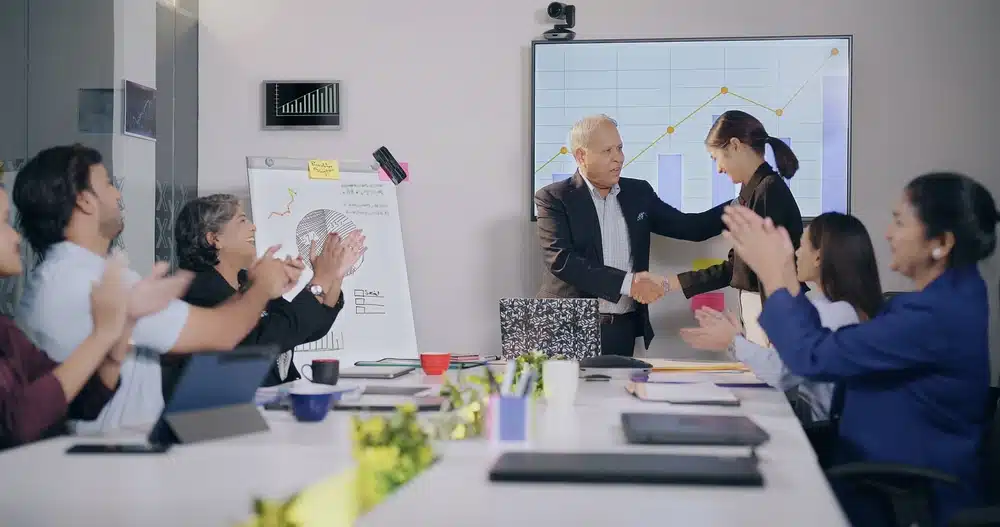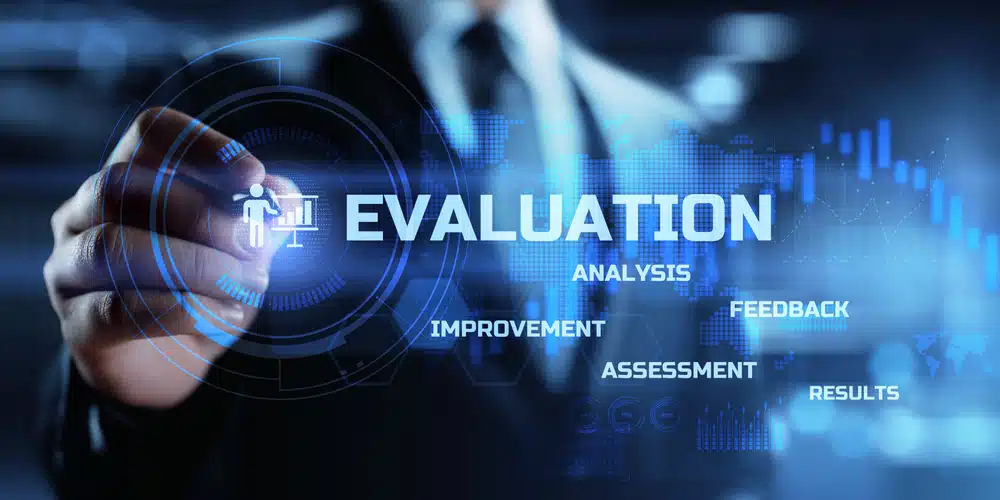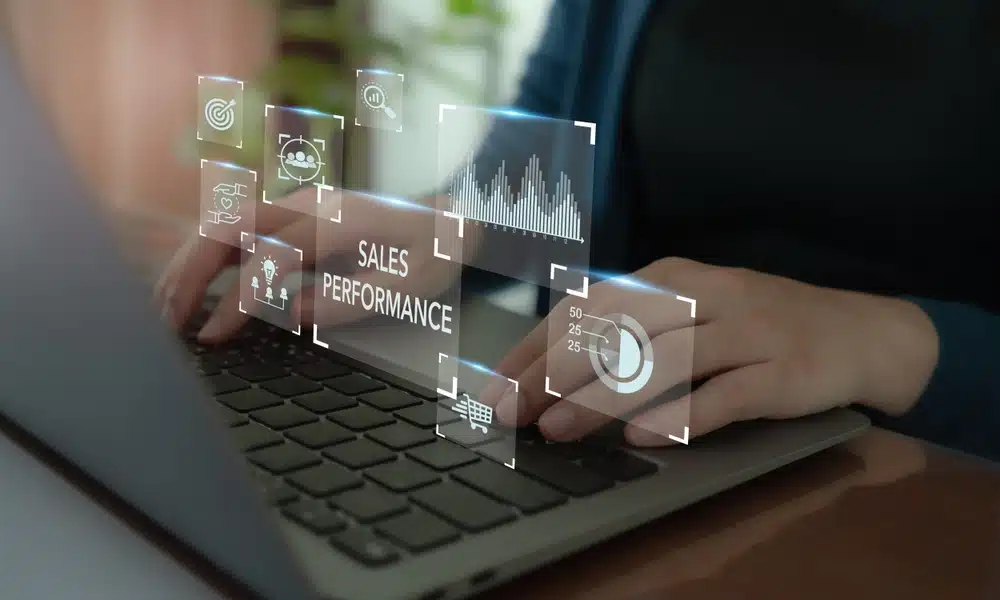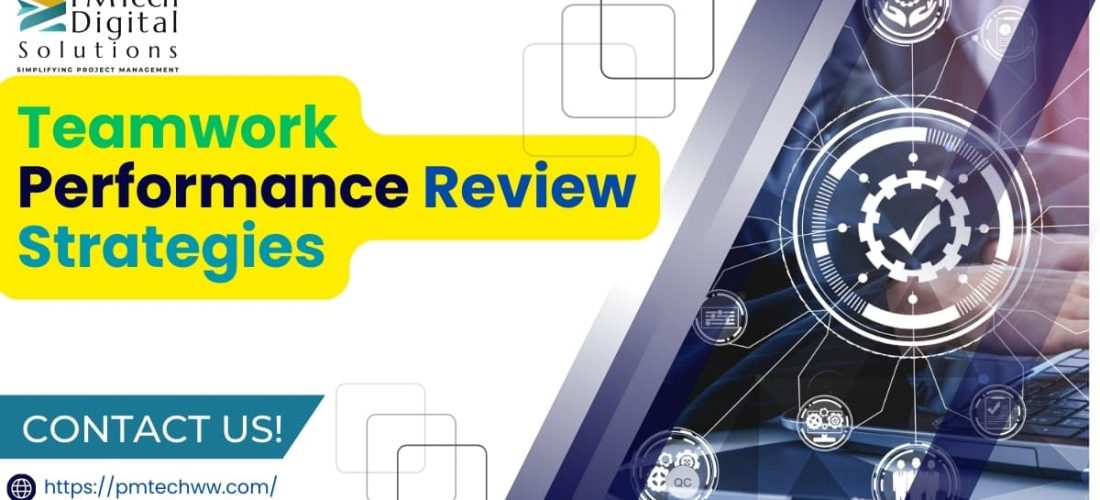When it comes to evaluating your team’s synergy, the ‘teamwork performance review’ is your compass. Are you seeking the right words to encourage collaboration, or the best strategies to gauge your team’s harmony and improve their teamwork skills? You’ve landed on the right page. Our guide provides specific phrases, actionable feedback tips, and measurement techniques to eloquently capture the pulse of your team’s performance, ensuring each member’s contributions enrich the collective achievement. Fostering a positive team dynamic is crucial for effective teamwork performance reviews and the team’s success.
Key Takeaways
- Effective teamwork performance reviews should celebrate individual contributions, address team dynamics, and encourage professional growth for the overall team’s success.
- Interpersonal skills such as communication, conflict resolution, and collaboration are critical to evaluate, as they are the foundation of strong team performance and successful project outcomes.
- A combination of quantitative metrics, qualitative assessments, and technology-enhanced tools is essential for measuring teamwork effectiveness and providing comprehensive feedback during performance reviews.
What are Teamwork Performance Reviews?
Teamwork performance reviews are a vital tool in assessing and enhancing the collaborative efforts within a team. These reviews provide a structured opportunity to evaluate how well team members work together, communicate, and contribute to the team’s overall success. By focusing on both individual and collective performance, these reviews help identify strengths, address weaknesses, and set goals for future improvement. Understanding the importance of these reviews is the first step towards fostering a more cohesive and productive team environment.
What are Performance Review Phrases?
Performance review phrases are concise statements that encapsulate observations about an employee’s teamwork skills, work ethic, and other relevant qualities. These phrases can highlight areas such as effective communication, problem-solving abilities, and dedication to team goals. For instance, a phrase like “consistently demonstrates strong organizational skills” can acknowledge a team member’s ability to manage tasks efficiently, while “needs improvement in meeting deadlines” can point out areas for growth. The primary purpose of these phrases is to provide clear, actionable feedback that can help employees understand their performance and how they can improve. By using well-crafted performance review phrases, managers can offer praise to those excelling and guidance to those who may need additional support.

How to Conduct a Performance Review for Team Success
Conducting a performance review for team success involves several key steps to ensure the process is thorough and constructive. Start by preparing thoroughly: gather relevant information about the team member’s performance, including feedback from fellow team members and supervisors. This preparation ensures that the review is based on comprehensive and accurate data.
Next, conduct the review in a timely and positive manner. Focus on specific examples of the team member’s strengths and areas for improvement. Use constructive feedback to highlight what they are doing well and where they can improve. Set clear goals and objectives for future performance, ensuring that the team member understands what is expected of them moving forward.
Finally, document the review and follow up regularly. This documentation serves as a reference for both the manager and the team member, helping to track progress and ensure that the agreed-upon goals are being met. Regular follow-ups provide an opportunity to discuss any challenges and celebrate successes, keeping the team member motivated and on track.
Preparing for Teamwork Performance Reviews
Preparation is key to conducting effective teamwork performance reviews. Start by gathering all relevant information about each team member’s performance. This includes feedback from fellow team members, supervisors, and any self-assessments the team member has completed. Having a comprehensive view of their performance ensures that the review is fair and balanced.
Set clear objectives for the review. Know what you want to achieve and what specific areas you want to address. This could include discussing the team member’s contributions to recent projects, their collaboration with other team members, or their progress towards personal and professional growth goals.
Ensure that the review is scheduled at a convenient time for both parties, allowing enough time for a thorough discussion. Prepare a structured agenda to keep the review focused and productive. This preparation helps create a positive and constructive environment, setting the stage for a successful performance review.
Best Practices for Conducting Virtual Performance Reviews
Conducting virtual performance reviews requires some special considerations to ensure they are as effective as in-person reviews. Here are some best practices to keep in mind:
-
Choose the Right Platform: Select a video conferencing platform that is user-friendly and reliable. Ensure that all participants are comfortable using the technology and have access to the necessary documents before the review.
-
Structured Approach: Use a structured approach to the review. An introduction, a discussion of strengths and weaknesses, and setting goals and objectives come next. This structure helps keep the review focused and ensures that all important points are covered.
-
Encourage Open Communication: Foster an environment where open and honest communication is encouraged. Listen actively to the team member’s concerns and feedback, and be responsive to their input.
-
Document and Follow Up: After the review, document the discussion and the agreed-upon goals. Follow up regularly to track progress and provide additional support as needed. This ongoing communication helps ensure that the team member stays on track and continues to develop their skills.
By following these best practices, you can ensure that your virtual performance reviews are effective and contribute to the overall success of the team.
Crafting Performance Review Phrases for Teamwork Success

In the thriving world of corporate collaboration, the resonant sound of constructive and positive feedback is integral to achieving team success. Carefully crafted teamwork performance review phrases act as navigational aids, steering team members and other team members toward the pinnacle of the team’s success.
Acknowledging each individual’s capabilities while navigating through various phases of team dynamics establishes fertile ground for professional development. This approach builds a solid base for fostering a positively dynamic atmosphere within the group that fuels both productivity and creativity.
Recognizing Individual Contributions
Recognizing the individual efforts of team members, such as Sarah’s sharp ability in problem-solving, is like appreciating the various shades that bring a tapestry of teamwork to life. By celebrating her substantial role, we not only affirm her importance but also encourage other fellow team members to engage with their distinctive streaks of inventiveness and dependability. These individual contributions significantly impact the team’s success, fostering a culture of strong collaboration and support for group objectives.
Addressing Team Dynamics
The transformation of individual efforts into a unified thrust is the essence of the team’s success, propelling the group towards its objectives. The processes through which this happens often involve team meetings and performance reviews, serving as a refinement ground where difficulties are converted into chances for advancement.
Through positive criticism of how we interact and motivating members to take on a problem-solving mindset, robust and tougher teams are crafted.
Encouraging Professional Growth
Team development is fundamentally connected to the advancement of its individuals. Tailored coaching and systematic training opportunities, which are in sync with the dynamic aims of the team, should foster personal and professional growth—a process that ought to stem from comprehensive performance reviews. This approach not only enhances individual skills but also significantly contributes to the team’s success.
Evaluating Team Members' Interpersonal Skills

During performance reviews, assessing teamwork skills sheds light on an employee’s capacity to effectively communicate, manage disputes, and work cooperatively. These abilities are the essential strands that weave together strong teamwork. Such evaluations help maintain the robustness and energy of the team’s success.
Communication Proficiency
Effective communication is like a beacon that steers teams through the murky waters of miscommunication. Being adept in this field entails more than just:
articulating or composing messages
listening attentively
offering constructive feedback
cultivating trust through transparent dialogue
These competencies, especially those related to teamwork, are vital for successfully maneuvering the intricacies of collaborative efforts and should be emphasized during any performance evaluation to ensure the team’s success.
Conflict Resolution Abilities
Just as a knotted thread can halt progress, so too can team conflict unless it is properly unraveled. Evaluating the capacity of a team member to resolve conflicts involves acknowledging their ability to interlace compromise and comprehension into the essence of collaboration, helping to create a seamless tapestry devoid of obstructive tangles. Effective conflict resolution is crucial for the team’s success, as it fosters a positive work atmosphere and enhances overall performance.
Collaboration & Support
Genuine collaboration resonates like a symphony when team members, akin to skilled virtuosos, come together in unity. By sharing their specialized knowledge and bolstering one another’s efforts, they craft a collective masterpiece that epitomizes the melody of the team’s success.
Impact of Teamwork on Project Outcomes

Harvesting the rewards of successful collaboration materializes in outstanding results of project endeavors. Effective teamwork pays dividends in the form of timely task completion, creative problem-solving, and exceedingly high standards of work quality, all of which ultimately contribute to the success of the team. When team members, along with their peers, recognize the significance of their combined efforts and the potential they possess collectively in carrying out team tasks, they reap a bounty.
Timely Completion of Tasks
The incessant pulse of time is a force that every project relentlessly follows, and it does not halt for any team. A group’s success in finishing tasks punctually reflects their proficiency in harmonizing efforts, exchanging technical knowledge, and maintaining the beat of efficiency. This ability demonstrates a team’s strength to align with the pace required by the project and fulfill its goals effectively, which is crucial for the team’s success.
Creative Solutions and Innovation
Creative solutions from team members serve as the catalyst for team success, solving current issues and illuminating paths for forward-thinking ventures. Acknowledging such innovations in performance reviews can stoke the embers of inspiration, encouraging the team to aspire towards greater achievements and contributing significantly to the team’s success.
Quality of Work Delivered
Recognizing the superior quality of work, akin to an artist’s masterful brushstrokes, is a testament to the skill and commitment of every team member. It is vital during performance reviews to acknowledge these contributions, as they not only reinforce the individual’s worth but also solidify the team’s esteemed reputation for delivering outstanding results, ultimately contributing to the team’s success.
Enhancing Team Morale & Spirit

The spirit and morale of a team greatly enhance its vitality. By fostering an environment where personal achievements are honored and every member’s input is appreciated, the strength of fellowship and dedication among the team members is amplified, driving both collective success and individual triumphs. Maintaining this thriving atmosphere hinges on having a positive attitude, which proves vital in cultivating such conditions. Team discussions serve as an important mechanism for preserving this positive outlook, playing a pivotal role in steering the group towards the team’s success.
Celebrating Team Efforts
Acknowledging our combined achievements during performance reviews is a potent stimulant for sustained excellence, enhancing morale, and crafting a common story of victory. This act of celebration resonates like a chorus through the corridors of the team’s success, reinforcing the collective might we possess.
Personal Acknowledgement
Within the collective success of a team, every member plays an essential role. Ensuring that each person’s efforts are recognized and valued during performance reviews not only celebrates their input, but also cultivates an environment where acknowledgement serves as a catalyst for motivation, personal growth, and the team’s success.
Best Practices for Delivering Teamwork Performance Reviews

To conduct successful teamwork performance reviews, it is crucial to maintain a fine balance between applauding successes and nurturing an atmosphere that promotes ongoing enhancement. By committing to top-tier methods such as establishing a collaborative setting, presenting varied viewpoints, and organizing evaluations for lucidity, we are able to master the subtle choreography of dispensing constructive criticism that not only elevates but also catalyzes change, ultimately contributing to the team’s success.
Creating a Cooperative Environment
Constructive criticism serves as a catalyst for team success within a cooperative environment. When performance reviews are conducted with an emphasis on the subtleties of effective collaboration, fostering honest communication, they create a foundation for shared development and cohesion among team members, ultimately contributing to the team’s success.
Offering Diverse Perspectives
By fostering an environment where team members are motivated to offer their distinct insights, performance reviews transform into a platform for vibrant dialogues and groundbreaking concepts. The development of diverse thinking serves as a springboard for creative solutions, broadening the range of what the team can accomplish collectively and ultimately enhancing the team’s success.
Structuring the Review for Clarity
In the realm of performance reviews, transparency is paramount. By establishing measurable objectives and utilizing methodologies such as Management by Objectives (MBO), the review process becomes a well-defined path providing feedback that team members can comprehend and apply, thereby steering them toward achievement with precision. This clarity is essential for the team’s success, as it fosters effective communication and collaborative efforts, enhancing overall performance and the achievement of group goals.
Tools and Techniques for Measuring Teamwork Effectiveness
A range of instruments, including quantitative metrics, qualitative evaluations, and technology-aided analyses, are at our disposal to gauge the success of team collaborations. These tools deliver an all-encompassing perspective on a team’s strengths as well as areas that require development in order to assess teamwork effectiveness thoroughly, which is crucial for the team’s success.

Quantitative Metrics
Quantitative metrics provide a clear and objective perspective on the effectiveness of a team, encompassing everything from individual member productivity to project cost-effectiveness. These hard facts serve as an anchor for understanding the real-world accomplishments of the team, highlighting that numbers are highly indicative in narrating the tale of the team’s success.
Qualitative Assessments
The qualitative evaluations, which go beyond just numerical data, truly reflect a team’s essence. By incorporating various viewpoints through structured assessment methods, one can gain a deeper and more complex insight into the nuances of team dynamics and interpersonal abilities. This enriches the context in which quantitative information is understood and adds significant value to the team’s success.
Technology-Enhanced Reviews
In the era of digital technology, a host of advanced tools have been introduced to improve the performance review process. Human resources-specific platforms such as Rise People streamline the establishment of objectives, monitor advancement, and support consistent dialogue to guarantee that performance reviews become a continuous catalyst for team progress rather than an annual occurrence, ultimately contributing to the team’s success.
Summary
As we draw the curtain on our exploration of performance review phrases for effective teamwork, we are reminded that the power of a team lies not in individual prowess but in the collective spirit that binds its members. May the phrases and strategies unveiled here serve as your compass in navigating the vast seas of team dynamics, steering towards horizons of shared success and uncharted territories of collaborative excellence, ultimately contributing to the team’s success.
This is where PMtech Digital Solutions comes in. At PMtech Digital, we offer tailored training programs, including all certification trainings of PMI, to suit your needs. For further details, contact us!
Frequently Asked Questions
How do performance review phrases impact team morale?
Phrases used in performance reviews that recognize both the personal achievements and collective work of a team can have a profound impact on uplifting the spirit within the group. By expressing appreciation for each member’s contribution, such feedback encourages ongoing commitment and excellence in performance.
As a result, this practice fosters an improved atmosphere of positivity and efficiency among team members during their collaborative endeavors at work, ultimately contributing to the team’s success.
What role do interpersonal skills play in team performance reviews?
Evaluating communication and collaboration, which are key interpersonal skills during performance reviews focused on team effectiveness, is vital because these abilities significantly influence the team’s success and the successful outcome of projects.
Can performance reviews really help in enhancing team dynamics?
Certainly, by delivering feedback and constructive criticism on how individual behaviors affect group performance, performance reviews have the potential to strengthen team dynamics and contribute significantly to the team’s success.
What is the importance of celebrating team efforts during performance reviews?
During performance reviews, acknowledging and honoring the collective endeavors of a team serves to strengthen their sense of unity and shared goals, which in turn enhances team spirit and drives enthusiasm for upcoming tasks. Celebrating these efforts is crucial for the team’s success, as it highlights the importance of collaborative efforts and effective communication among team members.
How can technology enhance the performance review process?
Employing HR-centric people management software technology can enhance the efficiency and efficacy of the performance review process. It simplifies setting objectives, monitoring advancements, and encouraging ongoing feedback to improve the overall performance review system, which is essential for the team’s success.






